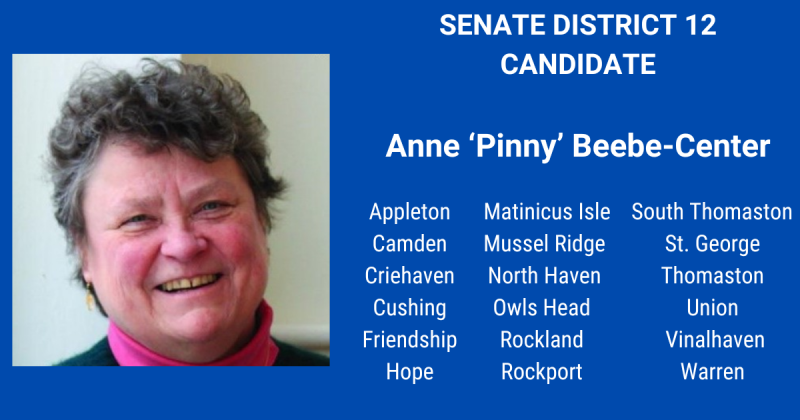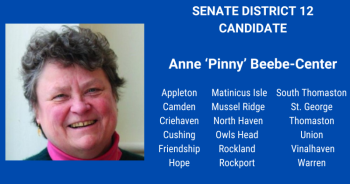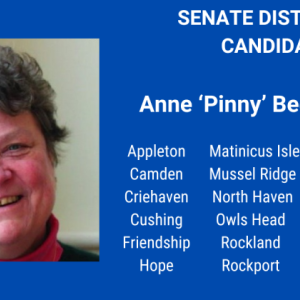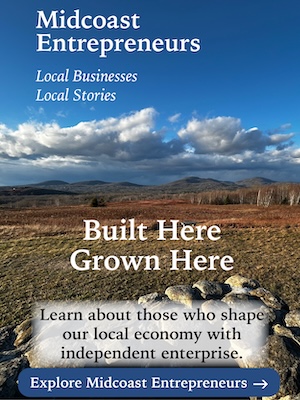On the issues: Senate District 12 candidate Anne ‘Pinny’ Beebe-Center
Penobscot Bay Pilot has posed questions to each candidate running for Maine State Legislature, providing the opportunity for the public to better understand their position on issues important to the state. Candidates responding with their individual written answers will have their responses stored in the Pilot’s 2022 Election Resource Guide.
Anne ‘Pinny’ Beebe-Center, a member of the Democratic Party, is seeking election to represent Maine Senate District 12, which includes Appleton, Camden, Criehaven Township, Cushing, Friendship, Hope, Matinicus Isle Plantation, Mussel Ridge Islands Township, North Haven, Owls Head, Rockland, Rockport, South Thomaston, St. George, Thomaston, Union, Vinalhaven and Warren.
She is running against Scott Rocknak; read his questionnaire here.
Please provide a concise biography of yourself, and state why you are running for political office.
I was born in Salem, Massachusetts but my father’s first posting in the U.S. Coast Guard was in Rockland, Maine. He was then transferred to South Portland. As a young child, I moved with my parents to Yarmouth, Maine. My father’s career of public service in the military inspired me to serve my own community, both in my employment for the state of Maine, and as a public servant as Knox County Commissioner for eight years and as a Maine State Representative for District 93 for three terms. I’ve lived and worked in Maine since 1975.
I’ve had a variety of professional and community work experiences. These include serving three terms as state representative in the Legislature for Rockland and Owls Head, as Regional Manager for Penquis Community Action Program where I started the Knox County Homeless Coalition, working at the Department of Transportation and the Department of Education, and as a teacher for the Riley School. My experience as a teacher gave me a deep understanding of the value of a quality education for everyone. I will advocate for equitable state funding for communities in Knox County and good policies to support schools. My responsibilities as Knox County Commissioner allowed me to gain valuable experience understanding how state and local governments work and how to pull people together to make things happen.
My work at in the legislature included serving on the Criminal Justice and Public Safety committee. My growing belief in the individual and social benefits from increased focus in this area led me to decide not to run for reelection to the House for a fourth term, but to concentrate my efforts in projects with the Knox County Sheriff’s department, the Belfast Reentry Center, and the Restorative Justice Project using my experience on the Criminal Justice and Public Safety Committee. Those efforts resulted in effective programs supporting those re-entering the community after leaving incarceration. As a result of that program, the recidivism rate in Knox County is at an all-time low.
Over the course of my public service career, I have learned that communities solve problems by working together. My legislative successes — from mental health to child abuse, or drug sentencing — gathered diverse factions, and crafted policies and laws uniting those voices, strengthening individual lives, as well as building community services for future generations.
My desire to help others and to improve government programs and systems has informed all of my decisions about employment and service in the public sector. I believe deeply in the inherent worth and dignity of every person. Helping others is a hard-wired value for me and one I experienced first-hand from caring family, teachers and other adults in the formative years of my life.
I will bring all of these experiences, skills and passion to serve the residents in Maine’s District 12 as their next Senator. My top priorities as senator will be health care for all, reproductive health, increased and accessible mental health treatment, addiction and recovery support, and ensuring that funding for schools is fair and equitable and continue the work the state is doing on climate change. I also intend to continue my work promoting a healthy future for marine resources and reforming criminal justice.
What are the three most pressing issues facing Maine, as a state, today, and how would you like to see them resolved?
Maine has seen great accomplishments in the public sector over the last four years but there is still much work to do in several key areas. First, across the state we’re suffering from a lack of affordable housing. Lack of affordable housing effects employers who are trying to attract qualified candidates and grow their businesses. It also affects our current workforce as rents and housing prices have increased substantially in recent years.
Another challenge for Maine is in healthcare, including behavioral health and reproductive health. The governor has expanded Medicaid, allowing many more Mainers to receive health care coverage, including preventative care. Her administration has also made other significant advances that help Maine families get their healthcare needs met. But more needs to be done to increase both the number of behavioral health services and access to those services. Many who need them, particularly in the wake of the pandemic, cannot access or afford them. This need is acute in our child and youth population who have struggled to catch up socially and emotionally due to the impacts of the pandemic, including school closures.
In addition to a shortage of affordable housing, I want to also help Maine enhance its economic growth and development by supporting prioritizing Internet structure, public transportation, and climate change.
Maine is grappling with a housing shortage, and legislation has been crafted — and passed last year — at the Maine Legislature to try and ease the situation by allowing greater density in all municipalities. Those municipalities now are analyzing this new state rule to understand how it applies to local zoning ordinances. Do you think this was an appropriate law to pass?
I do think it’s an appropriate law. Knox County towns are discussing increased density to determine how it might work in their communities. We need innovative and creative solutions to help businesses grow by ensuring there is adequate, affordable housing for workers. Allowing homeowners to build additional units on their property is a great step.
Do you have other ideas, and proposals, to help ease the housing problem?
Innovations such as tiny houses are a good solution as they allow homeownership at a lower price tag. We need communities to come to a consensus about what housing models they want to see that will enable people to live in our communities. The role of the legislature is to help remove barriers so that communities can implement their strategies. These are active discussions presently happening throughout Knox County.
What legislative committees would you like to serve on and why?
Marine Resources: A major part of our county’s economic health and wellbeing is connected to our ocean. With climate change and the warming of the Penobscot Bay and new federal regulations, it’s important that we protect and prioritize marine industries and occupations. The growth of aquaculture, although not fully supported by Mainers, is an innovative and significant growing industry.
Criminal Justice: We’re losing two Mainers each day to drug overdose. The way we deal with people who are addicted is we arrest them, put them in jail, and forget them. We don’t look at the impact on their communities, families, and children. I want to continue to provide alternatives for addiction recovery and incarceration that better meet the needs of the individual because our current system is one size fits all. We need to recognize the individual worth of each person and deal with them appropriately.
Maine’s economy relies on small and micro-businesses. How will you help the entrepreneur succeed in this state?
I’m a small business owner and understand the value this sector brings to Maine’s economy. One of the things we need to do a better job with is helping business owners grow their businesses. Resources, such as chambers of commerce and development corporations, are available to support business owners. We need to do a better job letting people know how they can be supported and be successful.
Maine is a fertile ground for starting and growing businesses. One of the boons from Covid is many people have been able to use the Internet to stay in business or stay employed. We’ve also seen others move to the state because they can work remotely. This emphasizes the critical importance of expanding high quality, reliable Internet service through every part of the state. I was excited to see the governor’s “Thrive Maine” initiative that will result in $120 million investment to help businesses succeed in Maine. This is just the beginning.
What are the greatest economic, cultural and social strengths in your district, and how will you support them?
I think the biggest strength we have in Knox County is our people. They are willing to discuss difficult issues, listen to opposing points of view and even when there’s agreement there’s still a willingness to continue the discussion and to create goals and implement action plans.
For example, Rockland is the arts capital of Maine. We’re fortunate to have artists who are also passionate about the health and wellbeing of our community. They are innovative in demonstrating how art can unite us. Art is being used as a way to engage and strengthen learning, help with addiction recovery, and enhance community building efforts.
For instance, CMCA and the Farnsworth Museum engage with communities across the county. Years ago, the Farnsworth’s Roger Dell worked with area schools to show how art can enhance and contribute to their learning and community involvement. One instance demonstrates how well this can work. Roger’s students started working with homeless families around the time I started the Knox County Homeless Coalition. They had a big event at the Strand Theater to talk about homelessness. School students provided some of the answers to the questions raised.
One question was about the success of homeless kids at school. Because the homeless students didn’t stand out in class in an obvious way, students learned that homelessness can be invisible. One student was aware of two homeless students in her class. She said she couldn’t tell they were homeless by any outside indicator. She said they always did their homework and contributed during classes. This taught her and other students that being homelessness didn’t mean hopeless or helpless. Having this conversation enabled the community to become more aware of the problem and more unified in their efforts to meet the needs of homeless individuals and families.
Another strength is our diverse economy. We have manufacturing, great marine industries, and tourism but our workforce has shrunk, particularly due to the pandemic. Maine lost much of its manufacturing over recent decades but news reports say that larger companies have made plans to bring back manufacturing plants back to the United States. The governor is helping ensure that Maine is part of those discussions.
We need to rebuild our workforce by offering additional training and growth opportunities as well as affordable housing. Also important is the need to continue to support companies who are willing to hire those who have been incarcerated. Those in recovery represent half of our workforce. Communities now welcome people back and support them rather than pretending they don’t count. It’s one of the reasons I’ll be continuing my work with criminal justice reform in both the community and in the senate.
What are the greatest problems in your district, and how do you intend to address them?
The greatest problems in the district are a lack of affordable housing, need for more Behavioral Health services, and building back our workforce.
Lack of affordable housing is affecting both employers and workers. Employers are trying to attract qualified candidates and grow their businesses but the lack of housing is creating barriers. It also affects our current workforce as rents and housing prices have increased substantially in recent years.
We need more behavioral health resources and easier access to those services. This need is acute in our child and youth population who have struggled to catch up socially and emotionally due to the impacts of the pandemic, including school closures. Working with school officials and school boards about how the community can provide better support and help to help strengthen the ability of schools to support students successfully socially, emotionally, and educationally.
Do you support construction of the 145-mile Central Maine Power transmission line from Quebec to Massachusetts?
No
The Maine Commission on Indigent Legal Services recently received funding from lawmakers to fund five public defenders to travel the state representing indigent defendants. Its executive director says that is “not a solution, it’s a patch" and that the agency needs an estimated $51 million to open public defender offices in all 16 counties. Should the legislature be looking to fund more public defenders?
There’s no excuse to not fund these key positions. We’ve known this is a problem for a long time. It’s one of the reasons we have so many people languishing in jail.
At least four county jails in Maine have combined to record nearly 1,000 phone calls between jailed defendants and their attorneys. What action would you like to see the legislature and governor take to ensure this never again happens?
We’ve already begun to make changes in both the jails and prisons by making phone calls to family and legal counsel less expensive. We should employ a system that lets callers know if their phone calls are being recorded. The jails have nothing to do with the phone service as it’s provided by private contract.
We had legislation introduced that would have added restrictions and requirements to these contracts in terms of recording conversations. The legislation was turned into a commission and that commission is to report its findings in the fall of 2022. That will lead to legislation to correct this problem.
Maine is one of 16 states that does not offer parole after abolishing it in 1976. Should the state reinstate the possibility of parole?
Yes, absolutely the state should. I’ve had personal experience working with a parole-type program: the Co-occurring Disorders Court in Kennebec and Knox Counties. The Co-Occurring Disorders Court allows eligible individuals who are in the criminal justice system because of serious substance use disorders to recover from addiction and reenter the community by dealing with the trauma that caused their initial addiction. We’ve seen dramatic positive change in the lives of individuals served by these courts and, significantly their children who are also traumatized by parents or caregivers who are addicted.
There is a statewide shortage of nurses willing to work at nursing homes and assisted living facilities. What more should the state be doing to attract workers?
More affordable housing will help. Wages are also an issue. In some cases, workers are expected to take on more responsibility than their education and training will support. The governor’s initiative, Healthcare Training for ME, will strengthen this sector by expanding access to free/low-cost training. This will allow workers to grow their careers and attract more to the field.
What is your position on abortion?
I believe all women have complete jurisdiction over their body and their health. It’s an absolute inviolable right. I support the efforts that have been made by the governor to expand legislation to protect that right. As Governor Mills said, “A woman’s right to choose is just that — a woman’s, not a politician’s.”
The Maine Dept. of Transportation is focusing more on active transportation (bike and pedestrian, as well as public transportation). How would you like to see this implemented in your district?
Transportation is a huge issue for many Mainers. The lack of access to reliable transportation effects every aspect of our lives, including our ability to raise families, access child care, work at a job, and pursue more education. Until it stopped due to Covid, the Waldo Community Action Program was operating a very successful and important public transportation system. Models like that are worth funding.
We also need to do a better job getting information to Mainers about reliable public transportation. Using these systems will also help us move away from our reliance on cars in more populated areas of the state thereby reducing emissions. We will also benefit by improving roadways for bicycle and pedestrian use. I support Governor Mills’ state plan to combat climate change.
What is your position on Gov. Janet Mills' energy policy?
I support the governor’s clean energy initiatives, including offshore wind, solar energy and helping homeowners and business owners increase efficiency in their properties.
If a voter expressed concern to you about voting security in Maine, how would you respond?
I think Maine has one of the best voting security records in the nation. Our elected officials take the system very seriously and are completely devoted to the integrity of each voter’s vote.
What is your position on gun control?
I think gun owners should be licensed. The same type of educational requirements and testing that are needed in order to receive a driver’s license should be required for a gun license. Also, I don’t see any reason for assault weapons to be privately licensed.
What is your vision of Maine in 20 years?
Housing will increase in density and affordability, allowing more Mainers to find and keep their housing. The air will be cleaner due to more green cars and greater use of public transportation, and other alternatives like walking, and bicycling. Our rivers and streams will be clean again. Our drinking water will be safe. Indigenous people will have complete rights to their land and waterways and will be viewed as full Maine citizens. Immigrant caps will be lessened so that our farmers can harvest all of their crops. We will have communities who support addiction recovery programs and help those coming from the correction system to transition successfully back to their communities. We will have a robust workforce that supports a growing Maine economy.
Free space! Is there anything else you want voters to know about you or your vision not addressed through this questionnaire?
My primary role as a Senator will be to work with communities to understand what laws will improve the lives of Knox County residents. Communication and interaction with Knox County community, business, individuals, families, schools, will guide my work in the senate.
























